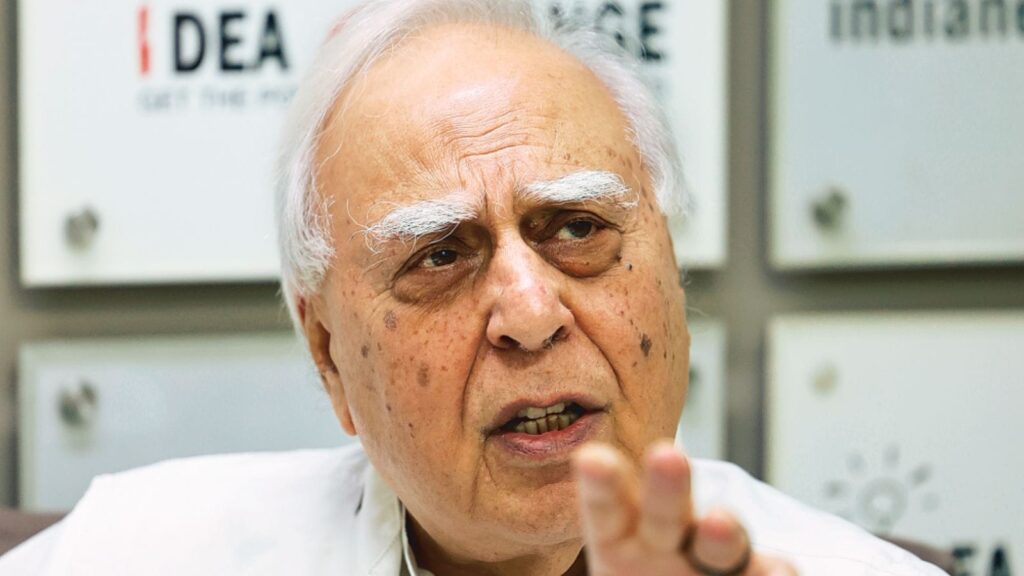Senior lawyer and Rajya Sabha MP Kapil Sibal represented West Bengal in the hearings into the reference made by President Droupadi Murmu under Article 143 of the Constitution after a two-judge Bench of the Supreme Court held in April that the Tamil Nadu Governor’s delay in granting assent was unconstitutional and set specific timelines for action. The reference carried 14 questions and the central issue raised was whether the judiciary can set a fixed timeline for Governors to act on Bills passed by elected state Assemblies.
The court on Thursday said no timeline can be fixed for President and Governors to assent to Bills and ruled against deemed assent to Bills. In an interview, Sibal explains why the court’s opinion passed by the court, which is advisory in nature, is a “great victory” for Opposition-ruled states. Excerpts:
* The Supreme Court today said that no timelines can be fixed for the President and Governor to act on bills passed by state legislatures, essentially rolling back parts of the April ruling by a two-judge Bench of the court. How do you see it?
There are two issues which they have, in a sense, rolled back. They have said the grounds on which a Bill is withheld, by the President or the Governor, are not justiciable. The merits of the withholding of the Bill are not justiciable. Therefore, the subjective satisfaction of the Governor and the President is not justiciable. The other thing they have rolled back is on strict timelines. They say that must be decided on a case-to-case basis, depending on the context of the legislation.
But they have also said in that process, where they have not rolled back, the primacy of the legislature needs to be respected. These constitutional authorities must work in tandem within the Constitutional framework and discharge their respective obligations under the Constitution. Then they have said that — which is also, I think, something commendable — that there are no four options with the Governor. There are only three options. Either he agrees with the Bill or he returns it. And once he returns it, then if it is sent back, he has to sign. If he withholds it, even then, he can refer it to the President. But if the Bill is sent to him and he is withholding it, then the reasons for his withholding are not justiciable. However, if there is a prolonged delay, courts can pass a limited order that you decide this. How much time they should decide it in will depend on the context and the facts of each legislation withheld by the Governor for a prolonged period of time.
The other important constitutional issue that it decides, which I think would be the subject matter of some debate in times to come, is that the subjective satisfaction of the President or the Governor is not justiciable. That is a matter that I think will be debated in years to come.
* Is there any option to approach the court again on this issue?
Issues will come up. Somebody will say that this may be in conflict with some other judgments of the court. But that’s something, as I said, that will be debated both inside and outside the court.
* Is it a setback for all the Opposition-ruled states that have been raising the issue of Governors sitting on bills endlessly?
No, it is a great victory. Because Governors have been withholding bills for three years, four years. You can’t do that. Obviously, it is a victory.
* The two-judge Bench headed by Justice J B Pardiwala had also granted “deemed assent” to certain pending Bills. The SC’s advice to the President states that “deemed assent” cannot be granted by the SC.
The deemed assent is a judicial verdict. It is not what the state did. Deemed assent is Justice Pardiwala’s verdict. The state governments did not say that. The state government’s position was that you must pass the Bill and tell us if you want to send it back, send it back. And if you have reasons as to why you’re withholding it, tell us. So I think it is entirely consistent. The states should be very happy that they have succeeded. The real issue, which, as I said, will require debate in the years to come, is the issue of justiciability. So far, judgments of the Supreme Court have held that no matter how high the Constitutional authority, it is subjective satisfaction. For example, the imposition of the President’s rule is based on subjective satisfaction. But it is justiciable. Subjective satisfaction under the Constitution so far has not been held to be justiciable, it is the only exception. So that’s a matter that I think will be debated in the years to come.
* How will this opinion be operationalised now?
That’s the other problem, because this is not a judicial opinion, it’s an advisory opinion. And now this question will come up in matters. And then the judgment of Justice Pardiwala will be cited. Then somebody will say that it requires reconsideration. And some of these things will have to be argued again.
* The Tamil Nadu government, for instance, immediately notified those Bills that were pending with the Governor after the April ruling.
That’s not interfered with. This advisory opinion cannot overrule a judicial opinion as a matter of law. So that’s done. It’s done and dusted.
* What remedy do the states have now?
I think if somebody is withholding a Bill, it depends on the nature of the Bill. For example, if Vice Chancellors’ vacancies are not filled for a year or a year and a half, at least, they can come and say, ‘Why have you not done that?’ And to that extent, the court has said there is limited judicial review. Why they have not been filled up can’t be the subject matter. With that said, it is subjective satisfaction.

